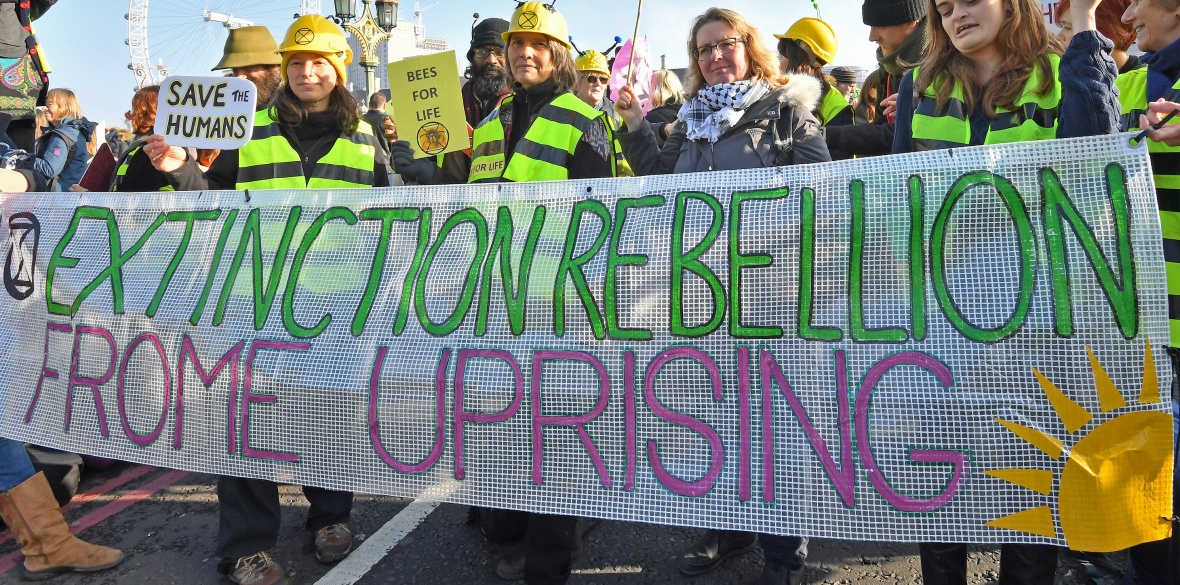

SOUTHAMPTON May Day celebrations were hosted jointly by Unite Community and Extinction Rebellion.
Extinction Rebellion is to be commended for keeping the climate emergency on the front pages. Occupying and greening public spaces, such as Waterloo Bridge, is in the best direct action tradition.
I’m more sceptical about disrupting public transport in the name of climate change, or protesting outside Jeremy Corbyn’s house when they recognise that he is the best hope to get us out of climate emergency. But all movements make mistakes.
The May Day event was in the best traditions of the day; the labour movement and the environmental movement working together and learning from each other.
Extinction Rebellion is not solely a movement of the young, but it is very much led by them. And of course the School Strike 4 Climate is, by definition, a young person’s movement. Indeed that’s the very point: if we don’t solve the climate emergency and halt global warning, their lives are at risk.
I was pleased to hear Extinction Rebellion saying at the May Day event that they are “standing on the shoulders of giants.”
It denotes a certain humility and recognition of history. The phrase was most famously used by Isaac Newton, and currently inscribed on our £2 coin in his honour. But Newton himself was quoting from medieval scholars and classical imagery.
The phrase is most commonly used in the scientific community to acknowledge that scientific breakthroughs build on previous discoveries. But it has a proud history within the labour movement as well.
Corbyn, speaking to the Scottish Labour Conference in Dundee in March 2018, used it to commemorate “those women trade unionists working in the jute industry in the 19th and 20th centuries.”
We say it regularly to acknowledge those who built the trade union movement, often at great sacrifice and surviving hardship and persecution; those who built the Labour Party and our welfare state; those who put their bodies on the line for women’s suffrage, civil rights and liberation movements; and those who fought for independence against colonialism and national self-determination.
When it comes to climate justice, we stand on the shoulders of scientists and of political activists. The scientific consensus that there is such a thing as climate change, that human activity is the cause and that we are at risk of destroying our planet is now clear, denied only by a few cranks.
The issue now is political action. We are inspired by individual acts of witness, such as Greta Thunberg’s quiet, determined refusal to attend school on Fridays, which quickly spread to the global school strike. We are inspired by mass collective protest, such as that by Extinction Rebellion or, as I write this, Greenpeace’s activists shutting down BP.
The great achievement is that mainstream politicians now accept that there is an emergency. The Labour Party took the initiative to ask Parliament to declare a climate emergency, gaining cross-party support.
Councils across the country have been innovative: the mayor of London aims for London to be a zero-carbon city by 2050, which would both reduce fossil fuel usage and tackle air pollution and fuel poverty.
In Southampton, Labour’s proposed Green City Charter was delayed by the Tories, despite claiming to campaign on climate change. Bristol City Council aims for zero carbon by 2030.
And councils are beginning to adopt the Preston model of procuring services from the local community: thinking globally and acting locally.
We can’t shy away from the class impact of climate change. On one level, it affects everyone. The rich can’t buy their way out of the consequences of the planet dying. And even if they live in gated communities, pay for expensive water and air conditioning, they can’t escape the effects of air pollution.
But while we still have water, the rich will pay for their supplies and will rail against the millions of environmental refugees leaving resource-depleted regions.
The consequences of climate change — droughts, fires, and floods — will have far more impact on the poor, particularly in the global South. As socialists and internationalists, we cannot let that happen.
Labour’s green environmental policy, bringing together economic and environmental principles and committing to banning fracking, encouraging renewable energy and making solar power affordable, is a good start.
Labour for a Green New Deal makes the point that there is no conflict between jobs and saving the planet, arguing for state intervention and investment so as to achieve zero carbon by 2030, and for solidarity with climate refugees.
Mainstream politicians now, particularly Labour politicians, should not forget that they stand on the shoulders of giants. Labour’s 20th century achievement of creating the NHS and the welfare state needs to be matched in the 21st century by a green revolution, based on redistributive, anti-poverty and internationalist principles.
Liz Davies is a barrister specialising in housing rights, an active member of Southampton Test Labour Party and vice-president of the Haldane Society of Socialist Lawyers. She blogs at www.lizdavies.org.uk.

Liz Davies is a Labour Party activist and housing rights barrister. Member of Southampton Test CLP and Unite the Union. Previously secretary for Hackney North CLP (2017–2018). Co-author Housing Allocation and Homelessness law and practice (Luba, Davies, Johnston and Buchanan, 2018, LexisNexis) and Honorary Vice-President of the Haldane Society of Socialist Lawyers. Her professional profile is here. She cannot respond to queries about legal cases through this website.
Read full bio